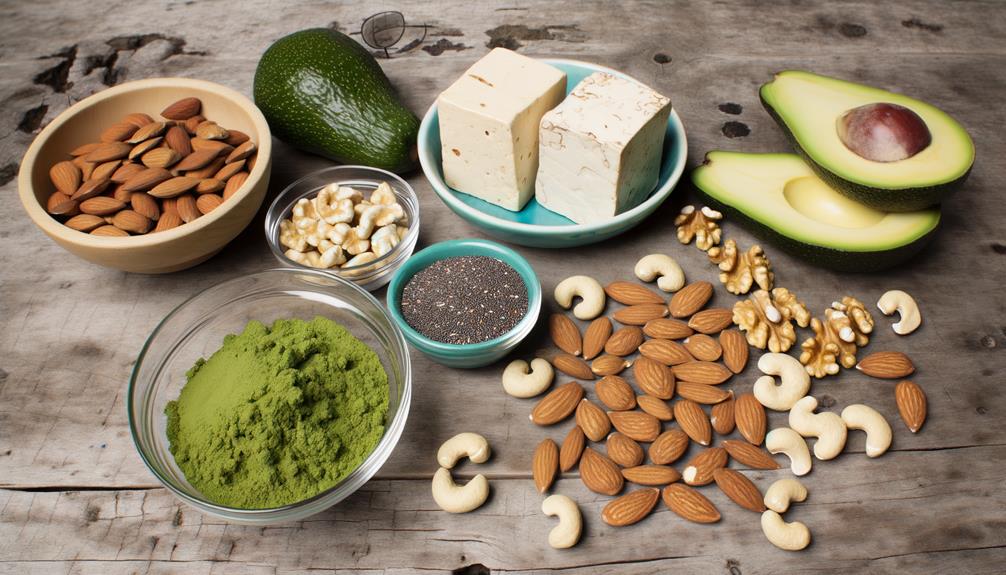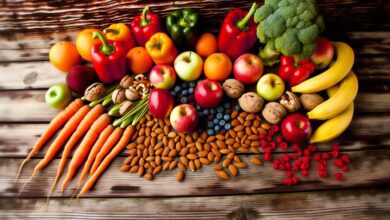You might not be aware that certain seeds, when sprouted, become powerhouses of protein suitable for a raw food lifestyle. As you embrace a diet that is kind to both your body and the environment, it’s crucial to know where your nutrients are coming from. Sprouted legumes, for instance, not only give your dishes a fresh crunch but also pack a significant protein punch. Similarly, soaked nuts and seeds offer a synergy of proteins and essential fats, vital for optimal health. While leafy greens may not be your first thought for protein, kale and spinach are surprisingly rich in this macro-nutrient. And let’s not forget about the micro-algae like spirulina—a true heavyweight in the raw food protein arena. With a mindful approach to your nourishment, you’ll discover that these plant-based proteins can sustain and even enhance your well-being. Stay tuned to uncover how to incorporate these nutritional gems into your daily routine, ensuring your raw food diet is as balanced as it is ethical.
Key Takeaways
- Sprouted legumes are a valuable source of plant-based protein in raw food diets, offering essential amino acids and nutrients.
- Soaked nuts provide a robust protein addition to a raw food diet, with the added benefit of reducing anti-nutrients through enzyme activation.
- Seed varieties, such as hemp seeds, peanuts, almonds, and chia seeds, offer significant amounts of plant-based protein and can be incorporated into various dishes.
- Leafy greens like spinach and kale are nutrient-dense, providing essential amino acids and helping maintain a balanced diet in raw food diets.
Sprouted Legumes
Sprouting legumes unlocks a powerhouse of plant-based protein, essential for maintaining a balanced and ethical diet in harmony with the earth. When you choose sprouted legumes, you’re not just nourishing your body with high-quality nutrients; you’re also supporting a lifestyle that respects our planet’s resources. These vegan sources offer a symphony of amino acids, including those necessary for a complete protein profile, which is crucial for overall health and muscle maintenance.
In your journey towards a raw vegan diet, sprouted legumes stand out as a sustainable choice. They’re teeming with life, offering more grams of protein and enhanced digestibility due to increased enzyme activity. This makes them a cornerstone for those who seek to serve others through compassionate food choices. Imagine integrating these raw food champions into your meals—crisp salads, refreshing wraps, or invigorating smoothies—all high in protein and vitality.
Soaked Nuts
Diving into the world of soaked nuts, you’ll discover they’re not only a robust protein addition to your raw food repertoire but also a pathway to improved nutrition through the simple act of soaking. For vegetarians and vegans, nuts and seeds are good sources of protein and soaking them enhances their benefits. The ritual of soaking not only increases the grams (g) of protein available but also makes them complete sources of protein, as the process activates vital enzymes.
When you soak nuts, the activation of these enzymes leads to a reduction in anti-nutrients, such as phytic acid, which can inhibit mineral absorption. Here’s a quick glance at the plant-based protein content in some favorite soaked nuts:
| Nuts | Protein (g) per 1/4 cup | Soak Time (Hours) |
|---|---|---|
| Almonds | 7.62 | 8-12 |
| Walnuts | 4.5 | 4-6 |
| Cashews | 5 | 2-4 |
You can also transform these soaked nuts into raw nut butters or even dairy-free nut milks, enriching your diet with high protein, creaminess, and flavor. As you serve others through conscious, plant-based choices, integrating soaked nuts into meals is a testament to your commitment to ethical and holistic nourishment. Consider vegan protein powders as another complement for rounding out your protein needs.
Seed Varieties
Exploring the diverse world of seed varieties offers a treasure trove of plant-based proteins that cater to ethical eating and holistic health. Hemp seeds, for instance, are a standout with a whopping 31.6g of protein per 100g. They’re not just a good source of protein; they’re rich in omega-3 fatty acids and iron, invaluable for your well-being.
In your quest for raw vegan protein, don’t overlook the humble peanut. Despite its simplicity, it packs 25.8g of protein per 100g. It’s a protein powerhouse that’s easily digestible, aligning with your compassionate lifestyle. Similarly, almonds are a respected source of plant protein, offering 21.1g per 100g. They’re more than just a snack; they’re a gift of health.
Then there’s the vibrant vegan ‘chocolate’ of the nut world, pistachio nuts. With 20.2g of protein per 100g, pistachios not only provide a high amount of protein but also boast a better omega fat ratio than almonds – a thoughtful choice for a balanced diet.
Chia seeds, along with pumpkin, flax, and sesame seeds, are small but mighty. Each contains a significant protein per serving, with Chia seeds featuring 16.5g. They’re perfect for anyone seeking a diet rich in protein and amino acids. These seeds are more than just food; they’re the seeds of life.
Leafy Greens
When considering the protein content in raw food diets, leafy greens like spinach and kale are not only nutrient-dense but also provide essential amino acids that are vital for your health. As you seek to nourish your body and serve others through compassionate dietary choices, these vegetables contain protein that supports your ethical and health-focused lifestyle.
Leafy greens are more than just a garnish on your plate; they’re powerful allies in your quest for wellness. Here’s why they’re outstanding in the realm of plant-based nutrition:
- Spinach: This versatile green packs 2.9g of protein per 100g. It’s perfect for adding a protein punch to your smoothies and salads.
- Kale: With 3.3g of protein per 100g, kale is a robust source of nutrition and can be enjoyed in countless raw dishes.
- Essential Amino Acids: These leafy powerhouses help you meet your essential amino acid needs, crucial for maintaining a balanced diet.
Spirulina and Algae
As you embrace a raw food lifestyle, incorporating spirulina and algae in your diet can significantly boost your protein intake with their remarkable nutrient profile. Spirulina, a powerhouse of nutrition, offers a high protein content—about 57.5g per 100g—which is truly impressive for a plant-based source. As a vegan, finding good, substantial protein sources can be a challenge, but spirulina and algae stand out as great sources of protein that align with your ethical values.
Spirulina is not only high in protein but also rich in essential amino acids, the building blocks of protein that your body cannot synthesize on its own. This means that you’re not just getting protein, but you’re also ensuring that you receive all the amino acids necessary for optimal health. These algae are versatile and can be seamlessly added to green smoothies or raw vegan protein bars, enhancing the nutrient density of your meals without compromising on taste or your commitment to a raw food diet.
Nutritional Yeast
Building on the protein-rich foundations laid by spirulina and algae, nutritional yeast emerges as another stellar plant-based protein source to enhance your raw food repertoire. Often fondly referred to as “nooch” in the plant-based community, this powerhouse ingredient is not only a favorite for its cheesy, nutty flavor but also for its remarkable nutritional profile.
Nutritional yeast boasts a significant amount of complete proteins, containing all nine essential amino acids that your body can’t produce on its own. It’s a reliable way to meet your daily protein intake, especially on vegan diets where finding adequate protein sources for vegans can be challenging. Here’s how you can incorporate nutritional yeast into your diet:
- Sprinkle it over salads or popcorn for an umami flavor boost.
- Blend it into sauces and dressings for a creamy texture and a nutrient punch.
- Combine with hemp seeds in recipes to create a diverse profile of amino acids in vegetarian dishes.
The ethical choice to adopt a plant-based diet doesn’t mean compromising on nutritional value or taste. Nutritional yeast is more than just a protein supplement; it’s a testament to the versatility and richness of plant-based eating, ensuring that you’re not only serving yourself but also nourishing the world around you.
Avocado Richness
Dive into the creamy world of avocados; a fruit that not only enriches your raw food diet with 2 grams of protein per 100 grams but also offers a bounty of healthy fats, fibers, and vital nutrients. This vegan marvel is a testament to the richness that plant-based foods provide, allowing you to nourish your body and honor the planet simultaneously.
In your quest for the best protein sources, don’t overlook the nutritional quality avocados bring to your table. Their high G content of Omega-3 fatty acids is great for your heart and brain, while the fiber ensures you’re satiated, curbing the urge for less wholesome snacks. When you pair avocados with hemp seeds in a salad or a smoothie, you’re not just enjoying a decadent texture; you’re also getting a fusion of proteins, including all nine essential amino acids—a rarity in plant-based foods.
Avocados, with their decent amount of protein, are a delightful addition to your raw food repertoire. They’re a silent promise of wellness, a creamy companion in your compassionate culinary journey. Embrace them in your vegan foods, and let their richness elevate your ethical eating to new heights.
Raw Protein Powders
Turning to raw protein powders, you’ll find that they are a powerhouse of plant-based nutrition, offering an effortless protein boost to your raw vegan lifestyle. These powders are an excellent ally for anyone seeking to enhance their intake of dietary protein and amino acids in vegetarian diets, without straying from their ethical compass.
Consider integrating these protein-rich supplements into your daily routine:
- Hemp Protein: Derived from hemp seeds, this powder is not only rich in protein but also provides essential fatty acids. It’s an ethical choice that supports your body and the planet.
- Sprouted Grain Powders: Sprouted grains enhance nutrient bioavailability, making these powders a smart addition to your vegan salad or green smoothie.
- Pea Protein: A sustainable alternative to soy products, pea protein is kind to the earth and gentle on your system.
You’re not just nourishing your body with these choices; you’re also serving others by advocating for a diet that respects all forms of life. Every scoop of raw protein powder, whether mixed into a vibrant fruits and vegetables smoothie or sprinkled on a hearty salad, is a step towards a compassionate, health-conscious world.
Soaked Grains
When you soak grains before consumption, you not only ease their digestibility but also unlock a richer profile of proteins essential for your raw food journey. Soaked grains become a cornerstone of sustenance, particularly for those embracing a vegetarian or vegan lifestyle. By sprouting whole grains, such as the pivotal components of Ezekiel bread, you’re aligning with a practice that’s as ancient as it is nourishing.
Soaking reduces anti-nutrients and enzyme inhibitors, allowing your body to absorb more of the goodness within. For instance, hemp seeds, a powerhouse of protein, offer about 10 g content per three tablespoons, contributing significantly to your daily requirements. Including these in your raw food repertoire ensures you’re not only meeting nutritional needs but also honoring the body’s natural processes.
Frequently Asked Questions
How Do You Get Protein on a Raw Diet?
You’re wondering how to fuel your body with raw protein? Sprouted legumes, seed varieties, nut butters, and protein-rich fruits are key. Soaking nuts, enjoying green leafy veggies, and adding hemp seeds or algae supplements will nourish you.
Where Do Raw Vegans Get There Protein From?
You’ll find protein in sprouted legumes, protein-rich seeds, and nutritional yeast. Algae supplements, hemp hearts, and green leafy veggies offer raw protein. Fermented foods, pea protein, and protein smoothies are ethical, compassionate choices.
What Is the Best Source of Protein Without Eating Meat?
You’ll find rich protein in plant-based powders, almond butter, and spirulina snacks. Chia seeds, hemp hearts, and pumpkin seeds are ethical choices. Quinoa bowls, buckwheat groats, and green peas serve your body and values.
What Non Animal Foods Are High in Protein?
You’ll find protein-rich seeds, like chia and hemp hearts, and superfoods like spirulina, are all fantastic non-animal foods high in protein, offering you ethical, plant-based nourishment while serving your body’s needs.







